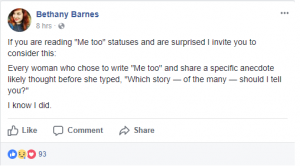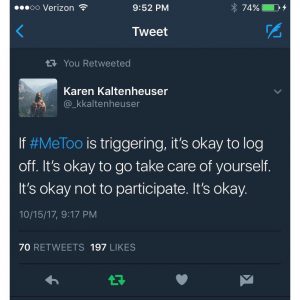“Me too.”
~Hagar (Gen 21), Bilhah (Gen 30), Dinah (Gen 34),
Tamar (Gen 38), Bathsheba (2 Sm 11), Tamar II (2 Sm 13),
Unnamed Woman (Jgs 19-21), and countless more
On October 15th, a saddening trend began on Twitter and Facebook. I started seeing posts from friends and acquaintances saying, “Me too.
If all the people who have been sexually harassed or assaulted wrote “Me too” as a status, we might give people a sense of the magnitude of the problem. Copy/Paste #metoo”
These posts began as a response to the growing allegations against film producer Harvey Weinstein, but were trying to show that this tragic problem goes above and beyond Hollywood or any one man.
There is far more to this conversation than I can say in a single blog post. And honestly there are far better theologians than myself who have tackled this subject.
But as I read post after post of those I know and care about sharing this unspoken pain. I had to decide whether or not I would post as well.
Because honestly, me too.
And for me, today was hard. It was difficult for me to see post after post of women and men sharing in this experience. There were some who just posted simply “me too”. Some posted the call to copy and paste. Some shared their experiences. And some, like me, recognized that they had more experiences of harassment and/or assault than could fit in a Facebook post.
I appreciated a post shared by a friend:
And I thought about logging off. I thought about not sharing that I was one of the millions of people who experienced this brokenness. And if I had chosen that route, that would have been just fine.
I knew that my voice didn’t need to be added, as of the time I’m writing this post, Facebook says more than 7 million people are talking about #metoo. 7.04 million people who are talking about sexual harassment and sexual assault.
That might be around 7 million more people than were having this conversation last week.
One voice out of 7 million, mine could be silent.
But I posted any way.
I posted #metoo because I knew there were so many women and men who felt that they couldn’t post today. Those who experienced this kind of physical and emotional violence against their bodies and their very selves. I rejoiced in the bravery of those who posted, and for those who logged off and took care of themselves.
I posted #metoo because there are so many in history whose stories we will never know. So many people who never would know what “#metoo” could mean, or what an impact it could have to know that they were not alone.
I posted #metoo because even our scripture, even our holy text, holds this kind of violence and brokenness. And after being victimized, the voices of these women are never heard again, if they ever spoke in the first place. Women whose names we know like Hagar and Tamar, and women whose names we will never know, because their violence was never about them in the first place.
And I posted because in moments like these, sometimes our voices failed us. They did not do what they should have done. They did not cry out. Our voices fail to name the harassment and name the harasser. Like Hagar, Bilhah, Dinah, Tamar , Bathsheba , Tamar II, and so many more victims of assault or harassment in our holy texts, voices fail or fail to be heard.
I posted #metoo, because…me too. In a hospital. At church. At a party. In front of others. In front of no one. Wearing my collar. By a friend. By a classmate. In seminary and undergrad. In high school. Even in middle school. By someone I trusted. By a stranger.
For all the times I failed to be “brave” and name what was happening. For all the times my voice failed me, and for all the voices that failed us.
Because our voices should never have had to save us in the first place.
Because there is a problem in our world.
And it’s time we listen to all the voices speaking up, and use our voices to do something about it.
I pray that as many of us lift our voices, as our voices cry out “me too”, along with all the voices that spoke or were silenced before us. God hears our cry, because our God is always hearing the cry of God’s people. Lord, change the hearts of those who know the impacts of their maliciousness on those they harm. God, open the eyes of those who do not recognize the harm their actions are causing. Guide us and strengthen us to lift our voices to you, and our voices to action to protect those in need. And please God, bring your peace, your comfort, your kin-dom, in the incredible love and mercy you give us in your Son, Jesus Christ, amen.
For more information on scripture and gender-based violence, you can read the in-process statement by the ELCA “Gender Based Violence”, or read Pamela Cooper-White’s, The Cry of Tamar, or Phyllis Trible’s Texts of Terror. I also encourage you to continue this conversation. Whether that be making sure your church or place of employment has a policy on sexual harassment and assault, working within the spheres in your life where you may have influence, or listening to those who are willing to share their stories and just simply believing them.



Leave a Reply